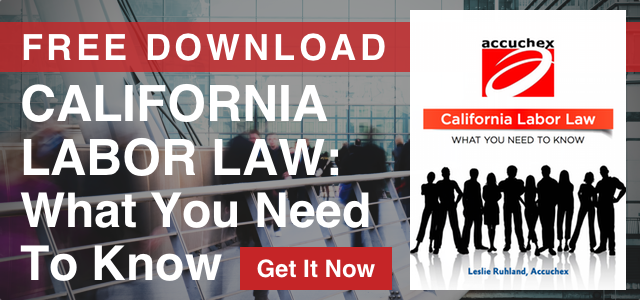With the 2016 California legislative session at an end, a large number of new labor laws have been enacted.

California as a Legal Forerunner in Labor Laws
As with most everything else in California, legislation here tends to set the pace or even raise the bar for the rest of the nation.
During the Society for Human Resource Management’s 2015 Employment Law & Legislative Conference in Washington, D.C. held last month, attorney Joseph Beachboard made this comment, “California is unique. We could spend all three days of the conference talking about what makes this true.”
An article from CNN echoed this sentiment recently:
“The state has been first to pass major public health initiatives that have spread throughout the country. California was first to require smog checks for clean air, pass anti-tobacco initiatives and bike helmets laws. While these laws were met with skepticism and ridicule, they've often become standard practice in other states. The Golden State was first to ban smoking in workplaces, bars and restaurants in 1998. Now similar rules exist throughout the country.”
For example, California is only the second state in the nation to promulgate a statewide paid sick leave plan. This occurred on September 10, 2014 with the signing of the Healthy Workplaces, Healthy Families Act of 2014. Each year, it seems, brings new legislation with additional or changed regulations and reporting requirements. A large number of new employment laws for 2017 will soon go into effect as Governor Brown signed another large number of employment related bills from the California 2016 legislative session.
New Key California Labor Laws for 2017
Employers prohibited from requiring an employee to adjudicate a claim outside the state (SB 1241)
On September 25, 2016, Governor Jerry Brown signed SB 1241, which adds section 925 to the California Labor Code, prohibiting an employer from requiring that an employee who primarily resides and works in California adjudicate a claim outside the state or depriving the employee of the substantive protection of California law.
Any such prohibited provision is now voidable by the employee.
Effective January 1, 2017, employers doing business in California can no longer require, in an employment contract or offer letter, that a California employee bring an employment dispute outside California or have a dispute decided under the law of another state or a foreign jurisdiction.
Where an employee voids such a provision under the new law, the matter will be adjudicated in California under California law. The legislation exempts contracts regarding venue, forum or choice of law where the employee is individually represented by legal counsel in negotiating the agreement.
SB 1241 covers agreements entered, modified or extended after January 1, 2017, whether they apply to court proceedings or arbitration. This means that an employer may not use an arbitration clause to require that a dispute be heard outside California or to avoid the application of California law.
In addition, attorneys’ fees are available to employees who successfully enforce their rights under the new law.
Removing juvenile convictions from the scope of convictions that employers are permitted to ask about (AB 1843)
It used to be that California employers could freely inquire about and consider a job applicant’s history of criminal convictions in determining any condition of employment including hiring, promotion, or termination.
Although California law did prohibit employers from asking about or considering arrests, or detentions that did not result in convictions, the law did not impose any restrictions regarding what types of convictions employers could ask about or consider.
No longer.
On September 27, 2016, California Gov. Jerry Brown signed AB 1843, which removes juvenile convictions from the scope of convictions that employers are permitted to ask about or consider.
Specifically, the newly signed bill defines “conviction” to exclude convictions by a juvenile court. It prohibits an employer from asking a job applicant to disclose information (or seeking information from any source) regarding a juvenile court’s adjudication.
The new law also prohibits an employer from considering an adjudication or court disposition by a juvenile court as a factor in determining any condition of employment.
Employers to Provide New Hires with Written Information about Time-Off Related to Sexual Assault, Domestic Violence or Stalking (AB 2337)
Labor Code section 230.1 prohibits employers with more than 25 employees from discriminating or retaliating against employees who are victims of domestic violence, sexual assault, or stalking from taking time off from work for specified purposes to address the domestic violence, sexual assault, or stalking.
This bill would add new subsection (h) to require employers to provide written information regarding these rights under section 230.1 and rights under Labor Code section 230, subsections (c), (e) and (f) prohibiting retaliation and requiring employers to reasonably accommodate victims of domestic violence, sexual assault or stalking.
Employers will be required to provide this written information to new employees upon hire and to other employees upon request.
The bill also requires the Labor Commissioner to develop a form employers could use and to post it on its website by July 1, 2017, and specifies that an employer need not comply with these notice requirements until the Labor Commissioner posts the form. Alternatively, employer’s may develop and use its own notice provided it is “substantially similar in content and clarity” to the Labor Commissioner’s form.
Businesses to Provide Single-User Restrooms (AB 1732)
In contradiction to North Carolina’s recent public restroom legislation requiring people to use public restrooms that correspond to their biological gender, California has passed a law requiring public facilities be designated “all gender” restrooms.
Assembly member James Gallagher was one of 18 assembly members who opposed the bill. He argued that if the bill became law, that would give the state the power to decide how individual business owners and public entities should best serve their customers. He also argued that the gender inclusive restroom bill would inconvenience far more people than gender specific restrooms did.
On September 29, 2016, California Gov. Jerry Brown signed A.B. 1732, which requires all single-user restroom facilities in any business establishment, place of public accommodation, or government agency to be identified as “all gender” facilities rather than being designated as male- or female- only.
The law also authorizes public inspectors or building officials to inspect facilities for compliance with the new ordinance.
This bill will be codified as Section 118600 of the California Health and Safety Code and goes into effect March 1, 2017. In compliance with the new law, businesses should immediately look into whether their single-occupancy restrooms need to be re-designated.
Looking for Professional Help With HR Compliance
An updated and streamlined reporting strategy will help your organization meet its obligations, while providing accuracy and timeliness. So take time to understand the new laws and prioritize accurate record keeping. In this way, you will make compliance a sure thing.
Another key step in maintaining HR compliance and increasing your company's cost-effectiveness is to consider outsourcing. A professional agency such a Accuchex can provide much-needed help with Human Resources needs and questions.
Accuchex is a full spectrum Payroll Management Services provider offering expertise in Time Management, Insurance and Retirement issues, as well.


